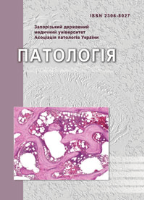
Pathologia
Scope & Guideline
Unveiling Insights in Clinical and Experimental Pathology
Introduction
Aims and Scopes
- Clinical Mycology and Infectious Diseases:
The journal extensively covers clinical aspects of fungal infections, including their diagnosis, treatment options, and management strategies in various patient populations. - Molecular and Genomic Insights:
It emphasizes the importance of molecular techniques, including genomic sequencing and molecular typing, to understand fungal pathogens and their resistance mechanisms. - Epidemiological Studies:
Pathologia publishes research on the epidemiology of fungal diseases, tracking trends, risk factors, and outcomes in different geographical and clinical settings. - Innovative Diagnostic Methods:
The journal highlights advancements in diagnostic methods, particularly those that improve the speed and accuracy of fungal infection detection. - Therapeutic Strategies and Drug Resistance:
A significant focus is placed on therapeutic approaches, including antifungal susceptibility testing and the challenges posed by drug resistance in fungal pathogens.
Trending and Emerging
- COVID-19 Associated Fungal Infections:
There's an emerging trend focusing on the relationship between COVID-19 and fungal infections, particularly mucormycosis and aspergillosis, as the pandemic has heightened awareness of these complications. - Fungal Resistance Mechanisms:
Research on the mechanisms of antifungal resistance is gaining traction, with studies examining genetic mutations and resistance profiles in various fungal species. - Metagenomic Approaches:
The use of metagenomic sequencing techniques is becoming increasingly popular for diagnosing fungal infections, particularly in complex clinical cases involving polymicrobial infections. - Pediatric Fungal Infections:
There is a growing interest in the study of fungal infections specifically in pediatric populations, addressing unique challenges and treatment approaches for children. - Environmental and Zoonotic Fungal Diseases:
Emerging studies are exploring environmental reservoirs and zoonotic transmission of fungal pathogens, reflecting a broader understanding of fungal ecology and public health implications.
Declining or Waning
- Traditional Mycology Techniques:
There is a noticeable decrease in studies utilizing classical mycological identification methods as molecular techniques become more prevalent and preferred for accuracy. - General Reviews of Common Fungal Infections:
General reviews discussing common fungal infections without new insights or data have become less frequent, indicating a shift towards more specialized, data-driven research. - Non-invasive Diagnostic Techniques:
Research focusing on non-invasive techniques that lack sensitivity or specificity in diagnosing fungal infections is appearing less frequently as the field moves towards more reliable molecular methods.
Similar Journals

MYCOPATHOLOGIA
Elevating research standards in mycology and plant health.MYCOPATHOLOGIA, published by Springer in the Netherlands, stands as a pivotal journal in the fields of mycology, plant science, and veterinary microbiology. With its extensive history dating back to 1938, this journal has consistently contributed to the understanding of fungal pathogens and their impact on both agriculture and animal health. It currently holds impressive rankings in Scopus, including Q1 status in Agronomy and Crop Science, and Q2 rankings in Applied Microbiology and Biotechnology, demonstrating its influence and rigor in the scientific community. Researchers and professionals benefit from its curated, high-quality studies which address critical areas such as plant-pathogen interactions and veterinary mycology. While not open access, MYCOPATHOLOGIA emphasizes comprehensive research output and serves as a vital resource for advancing knowledge and fostering innovation in its disciplines. The journal remains committed to disseminating valuable insights that drive forward both academic inquiry and practical applications in related fields, ensuring its relevance and importance in contemporary research.
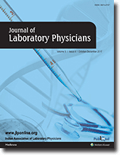
Journal of Laboratory Physicians
Transforming laboratory practices with innovative research.The Journal of Laboratory Physicians is a prestigious, peer-reviewed publication dedicated to advancing the field of laboratory medicine. Published by THIEME MEDICAL PUBL INC, this journal has established itself as a vital source of research and clinical insights since its inception, transitioning to Open Access in 2009 to broaden its reach and accessibility. With an ISSN of 0974-2727 and an E-ISSN of 0974-7826, it aims to provide a platform for professionals, researchers, and students engaged in laboratory-based studies to share critical findings and foster collaboration across disciplines. The journal's scope encompasses a wide range of topics relevant to laboratory physicians, ensuring that it remains an essential resource for those seeking to stay on the cutting edge of laboratory practices and innovations. By disseminating timely research and reviews, the Journal of Laboratory Physicians plays a crucial role in enhancing the quality of healthcare through improved laboratory services.
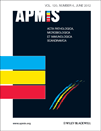
APMIS
Elevating Standards in Immunology and Pathology ScholarshipAPMIS is a distinguished academic journal published by WILEY that serves as a vital resource for researchers and practitioners in the fields of Immunology, Allergy, Microbiology, and Pathology. Established in 1988 and continuing its mission through 2024, this journal facilitates the dissemination of high-quality research findings, contributing to the intersection of multiple disciplines within the medical sciences. With an ISSN of 0903-4641 and an E-ISSN of 1600-0463, APMIS is categorized in 2023's Q2 and Q3 quartiles across various domains, reflecting its significant impact, with rankings such as #50/208 in Pathology and Forensic Medicine and #121/233 in Immunology and Allergy. Although it currently does not offer open access options, the journal’s rigorous peer-review process ensures that published articles maintain the highest standards of scholarship. With its focus on innovative research, APMIS continues to occupy a pivotal role for those seeking to advance their expertise and contribute to scientific dialogue in these essential fields.
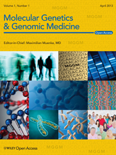
Molecular Genetics & Genomic Medicine
Pioneering research for a healthier tomorrow.Molecular Genetics & Genomic Medicine, published by WILEY, is an esteemed and open-access journal that has been a prominent source of knowledge in the fields of genetics and molecular biology since its establishment in 2013. With an ISSN of 2324-9269, it aims to provide a platform for the dissemination of novel findings and innovative research that pushes the boundaries of genomics and its clinical applications. The journal holds a Q3 categorization in Genetics, Clinical Genetics, and Molecular Biology, reflecting its growing influence in these disciplines, as evidenced by its Scopus rankings. Researchers, professionals, and students alike will find valuable insights and advancements in genomic medicine, making this journal an essential resource for those dedicated to the understanding and application of genetic and molecular research in healthcare. Located at 111 River St, Hoboken, NJ, Molecular Genetics & Genomic Medicine continues to foster a global dialogue within the scientific community, ensuring accessible knowledge for all.

Medical Mycology Journal
Fostering Collaboration in the Fight Against Fungal DiseasesMedical Mycology Journal is a leading publication in the field of medical mycology, dedicated to advancing the understanding and treatment of fungal infections. Published by the Japanese Society of Medical Mycology, this journal serves as an essential resource for researchers, clinicians, and students alike. With an ISSN of 2185-6486 and an E-ISSN of 2186-165X, it aims to provide high-quality peer-reviewed articles focusing on clinical and epidemiological studies, diagnosis, and novel therapeutic approaches related to fungal pathogens. Operating under a Q3 ranking in Infectious Diseases and having consistently published significant findings since its establishment in 2011, the journal is pivotal for those working at the intersection of mycology and infectious disease management. Although currently non-open access, the journal's insights are vital for expanding knowledge in this critical area of healthcare, addressing pressing global health challenges linked to fungal infections.

Current Fungal Infection Reports
Exploring the complexities of fungal diseases.Current Fungal Infection Reports is an essential academic journal dedicated to the rapidly evolving field of mycology, specifically focusing on the diagnosis, treatment, and epidemiology of fungal infections. Published by Springer, this journal aims to provide a comprehensive platform for researchers, healthcare professionals, and scholars to disseminate groundbreaking findings and insights into the complexities surrounding fungal diseases. With an ISSN of 1936-3761 and an E-ISSN of 1936-377X, the journal is recognized in the Q3 category for Infectious Diseases as of 2023 and holds a Scopus rank of #199 out of 344 in its field, showcasing its growing influence. Although not currently open access, Current Fungal Infection Reports remains an important resource for those wishing to stay updated on key developments and trends within this critical area of global health. Through its commitment to advancing knowledge and fostering academic exchange, the journal plays a crucial role in combating the challenges posed by fungal infections, making it a must-read for anyone involved in infectious disease research and treatment.
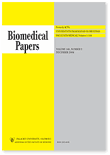
BIOMEDICAL PAPERS-OLOMOUC
Catalyzing insights in molecular biology and medicine.BIOMEDICAL PAPERS-OLOMOUC, published by Palacky University Medical Faculty, is a prominent open-access journal dedicated to advancing the fields of biochemistry, genetics, molecular biology, and general medicine. Since its inception in 2001, this journal has provided a vital platform for researchers, professionals, and students alike, fostering a collaborative environment for the dissemination of cutting-edge research findings. With a current impact factor reflected in its placement in the Q3 quartiles for both biochemistry and medicine categories, it demonstrates a growing influence in the academic community. The journal is indexed in Scopus, showcasing its relevance within the medical and biophysical sciences, and it operates in an open-access format to ensure broad accessibility of its articles. Set against the backdrop of Olomouc, Czech Republic, BIOMEDICAL PAPERS-OLOMOUC continues to contribute significantly to the global dialogue in biomedical research, making it an essential resource for anyone engaged in these dynamic and rapidly evolving fields.

VIRCHOWS ARCHIV
Fostering Knowledge in the Evolving Landscape of PathologyVirchows Archiv, published by Springer, is an esteemed journal dedicated to the fields of Medicine and Pathology, featuring high-quality research from various domains including Cell Biology and Molecular Biology. With its inception dating back to 1947, Virchows Archiv has been a pivotal platform for advancing the understanding of pathological and forensic medicine. As evidenced by its impressive Scopus rank, placing it within the top 15% of journals in Pathology and Forensic Medicine, it continues to maintain a strong presence with a Q1 classification in its category as of 2023. Although it does not offer Open Access options, the journal remains critical for researchers and professionals seeking to publish and access pioneering findings that can impact clinical practices and the academic community. The journal’s rigorous peer-review process ensures that only the highest quality research is disseminated, making it an essential resource for those engaged in the ever-evolving fields of health and biological sciences.

Malaysian Journal of Pathology
Connecting researchers and clinicians through impactful insights.Malaysian Journal of Pathology, published by the MALAYSIAN JOURNAL PATHOLOGY, stands as a pivotal resource in the fields of pathology and medicine, contributing rich insights since its inception in 1979. This peer-reviewed journal, based in Malaysia, is dedicated to disseminating original research, review articles, and case studies that advance the understanding of disease mechanisms and diagnostics. With a current impact factor reflecting its ranked positioning—Q4 in Cell Biology, Q4 in Histology, and Q3 in both Miscellaneous Medicine and Pathology & Forensic Medicine—this journal serves as an essential platform for researchers, clinicians, and students alike. Although it operates without open access, its scholarly rigor and contributions are well recognized, holding ranks such as #84 in Pathology and Forensic Medicine according to Scopus. The Malaysian Journal of Pathology is committed to fostering innovation and excellence in medical research, making it an invaluable tool for professionals seeking to stay abreast of significant advancements in the pathology domain.
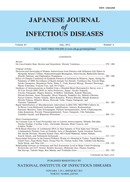
JAPANESE JOURNAL OF INFECTIOUS DISEASES
Bridging the gap between academia and public health practice.The Japanese Journal of Infectious Diseases, published by the National Institute of Infectious Diseases in Japan, serves as a vital platform for researchers, clinicians, and public health professionals committed to advancing the field of infectious disease science. With an ISSN of 1344-6304 and an E-ISSN of 1884-2836, this journal has maintained its academic rigor since its inception in 1961 and continues to contribute significantly to the global understanding of infectious diseases. The journal holds a Q3 ranking in the categories of Infectious Diseases, Miscellaneous Medicine, and Medical Microbiology as of 2023, reflecting its important role in disseminating impactful research. With many articles available through Open Access, it ensures wide accessibility to the latest discoveries and insights. Researchers can expect to find high-quality studies that address critical challenges in the control and prevention of infectious diseases, making this journal an essential resource for anyone engaging in this critical field.